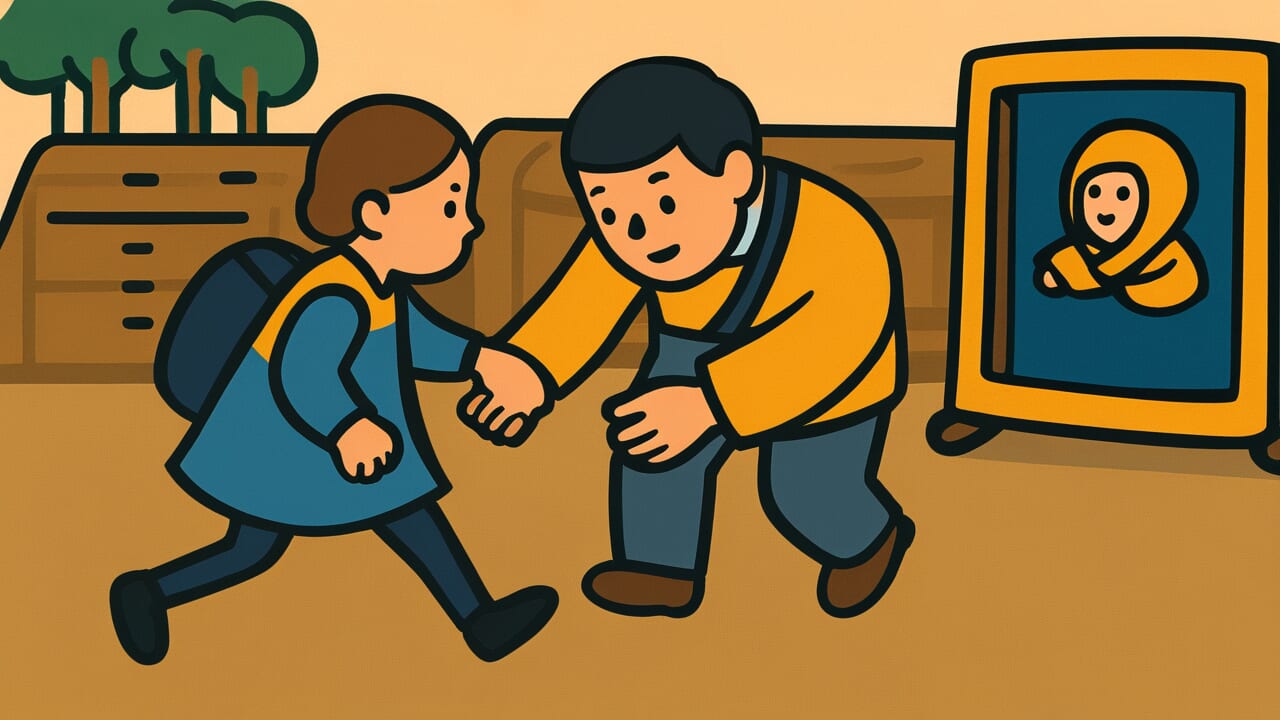How to Read “Searching for three years for the child on your back”
Ōta ko wo sannen sagasu
Meaning of “Searching for three years for the child on your back”
“Searching for three years for the child on your back” means keeping gratitude toward someone who helped you alive in your heart for a long time.
This proverb expresses the attitude of never forgetting to appreciate those who once helped or supported you, even as time passes.
It describes the feeling of constantly thinking about that person and seeking opportunities to repay their kindness, as if you had lost the child you’re carrying on your back.
People use this proverb when praising someone who never forgets a debt of gratitude, or when teaching the importance of maintaining thankfulness.
It expresses deep appreciation that doesn’t fade with time, not just temporary gratitude.
In modern society, human relationships often become shallow. But this proverb reminds us of the nobility of never forgetting kindness received and continuing to wish to repay it someday.
Origin and Etymology
No clear written records explain the origin of this proverb. However, the structure of the phrase reveals an interesting background.
“Ōta ko” means a child carried on one’s back. In old Japan, parents carrying children on their backs was an everyday sight.
We should note that this expression serves as a metaphor for relationships of gratitude, not just parent-child relationships.
Carrying a child on your back means literally bearing another person’s weight with your own body.
This beautifully expresses the essence of receiving kindness. Kindness means someone took on your burden. You can’t forget it because you felt that weight.
“Searching for three years” is also symbolic. In Japanese culture, three years has been used as a conventional expression meaning “a long period.”
Like “three years on a stone,” it represents the flow of continuing time rather than a specific three-year period.
In other words, this proverb expresses the beautiful human emotion of keeping gratitude toward those who helped you deeply engraved in your heart for a long time.
It’s like continuously searching for the child you carry on your back.
Usage Examples
- I still remember and thank my teacher who helped with my tuition when I was young, like searching for three years for the child on my back
- I’ve never forgotten the kindness I received back then, with the feeling of searching for three years for the child on my back
Universal Wisdom
The universal truth that “Searching for three years for the child on your back” tells us is about the weight of gratitude engraved in the human heart.
Why can’t people forget kindness they’ve received? It’s because the warmth of a hand extended during difficult times means more than just an action.
Someone spent their time, expended their effort, and sometimes even sacrificed themselves to help you.
That fact proves your existence was valued by someone.
The metaphor of carrying a child on your back is remarkably accurate. Receiving kindness means feeling the weight of another person.
That weight isn’t unpleasant at all. Rather, it lets you feel the certainty of human bonds. That’s why you keep searching for that person.
You want to repay the kindness, but even more than that, you have an earnest wish to meet that person again, say “thank you,” and confirm their existence.
This emotion never changes across time. Humans are social creatures who live within relationships with others.
Remembering kindness received means knowing you don’t live alone. The memory of gratitude is an important function of the heart that saves us from loneliness and preserves our humanity.
When AI Hears This
The comical situation of searching for a child while carrying that child on your back brilliantly represents the runaway “monitoring process” that the human brain possesses.
According to the ironic process theory proposed by Harvard psychologist Daniel Wegner, when the human brain consciously tries to “not search” for something, it paradoxically keeps searching for it.
This happens because the brain performs two processes simultaneously. One is the intentional process of “not searching,” and the other is the automatic process monitoring “am I really not searching?”
The problem is that this monitoring process constantly asks “where is the child?” and ironically maintains the search behavior.
Even more interesting is the situation this proverb shows: “continuing to search for an already-solved problem.”
In cognitive science, humans have the “Zeigarnik effect,” which strongly remembers unachieved goals.
In other words, the memory of the incomplete task “must find the child” is so strong that the brain ignores the ongoing sensory information of weight on the back.
This is an error in information processing priorities.
This cognitive trap perfectly matches the phenomenon where modern people keep searching for “a better job” or “a better partner” and can’t recognize the value of what they already have.
When the brain enters search mode, it’s designed to evaluate already-acquired information as less valuable.
Lessons for Today
What this proverb teaches us today is the value of carefully preserving memories of gratitude.
In modern society, everything flows quickly. Kindness received is soon forgotten, and consciousness shifts to the next event.
But what’s truly important is continuing to store that moment when someone did something for you as a treasure in your heart.
Keeping memories of gratitude enriches you. Remembering kindness means recognizing that you’ve been loved and supported.
That recognition gives you confidence and warmth. And that warmth becomes the driving force for you to help someone else.
Practically speaking, stop sometimes and remember the people who helped you in the past.
Even if you can’t repay them directly, you can circulate that feeling of gratitude as kindness toward someone else.
By not forgetting the kindness you received, the world becomes a gentler place.
Memories of gratitude connect us with invisible threads of human relationships and become the force that supports all of society.



Comments